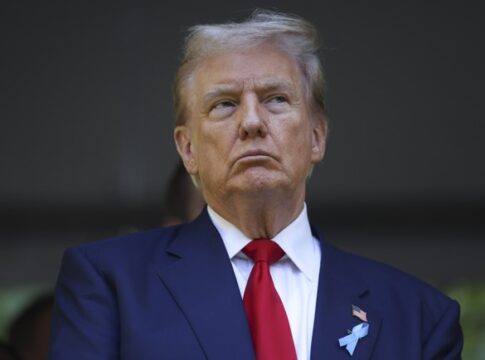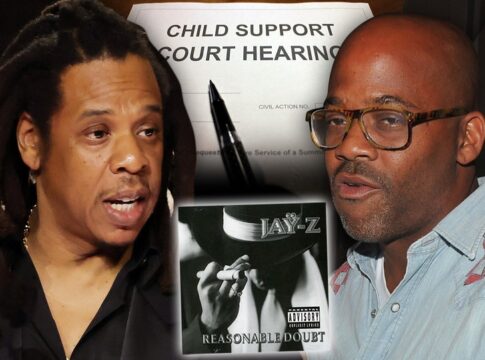A new book investigates a secretive Catholic sect that appears to have an outsized influence on U.S. courts and the law. While many associate Opus Dei with The Da Vinci Code and warmed-over conspiracy theories, British financial journalist Gareth Gore has shown that the group remains active and prominent. Gore’s new book, Opus: The Cult of Dark Money, Human Trafficking, and Right-Wing Conspiracy Inside the Catholic Church, traces the group from its origins in Franco’s Spain to its rising influence in Washington, D.C., where it has focused on capturing the federal judiciary and shifting it far to the right. On this week’s Slate Plus bonus episode of Amicus, Dahlia Lithwick and Mark Joseph Stern discuss a key player in this battle, Federalist Society co-chairman Leonard Leo; his efforts to silence critics who point out the authoritarian scope of his vision; and the real-world impact of his assault on personal freedoms.
Dahlia Lithwick: Mark, you and I both read the New York magazine piece about Leonard Leo, his deep connections to Opus Dei, and his interventions in commandeering the levers of democracy. Perhaps we should start with a quote from Leonard Leo, speaking in 2022, as he accepted the John Paul II New Evangelization Award at an event held by the Catholic Information Center in Washington, D.C.:
Current-day bigots, the progressive Ku Klux Klan, spread false and slanderous rhetoric about Catholic apostolates, and institutions like the one represented here tonight. They mock our practices and devotions. They repeat the KKK canard that Catholics want this country dominated and controlled by a theocracy, which no well-informed Catholics should ever support. And if you happen to be a particularly prominent Christian, they intimidate and harass you outside your home and in restaurants and stores with the express purpose of driving you into social and professional exile.
These barbarians, secularists, and bigots have been growing more numerous over the past few years. They control and use many levers of power. Yet even so, we cannot lose hope in the ultimate success of the new evangelization. With God, all things are possible. He has equipped us to carry out this mission no matter how impossible it may seem. As we prepare for this hard yet necessary task ahead, I urge us to remember three things. First, the threats to the new evangelization are not of flesh and blood. This is spiritual warfare. Our opponents are not just uninformed or unchurched. They are often deeply wounded people whom the devil can easily take advantage of. He has hardened their hearts and closed their minds, which means reason alone will not win this struggle.
What are your topline thoughts about Leonard Leo—who is, according to new reporting, sitting on bigger pots of money than both parties—and what do you think about his characterization of what we do?
Mark Joseph Stern: I want to reiterate that fact: Leonard Leo controls more money than both political parties right now in the United States! He’s one of the most powerful people in the country, arguably in the history of the country, when it comes to influencing the judiciary, and increasingly, political races. And yet anytime anybody criticizes him or his vast dark-money network, he claims the mantle of victimhood. He waves the flag of victimhood and alleges that anybody who would dare to say a cross word about him or his operation is in fact an anti-Catholic bigot. He used the word “bigot.” He also referred to his opponents as the modern Ku Klux Klan, which is a deeply offensive comparison. He suggests that his critics are wounded people who have been taken advantage of by the devil, by Satan himself, in order to stop his “noble” work to restore traditional values to America.
I want to be clear. His values are not necessarily the values that you, or I, or many, many others would associate as American values. He is promoting conservative Catholic values that frequently infringe upon the freedom of others. These are values that prohibit women from obtaining an abortion, even in the case of rape, even if it is necessary to preserve her health or even spare her from death. He has made it clear he believes that same-sex relationships should be unlawful, same-sex marriages should be nullified, abolished. He believes that much of modern secular society is under the control of the devil. So he uses his authority, and specifically his money, to try to restrict other people’s rights and to try to impose these reactionary values. But he also insists his work, his values, are above all criticism—that vigorous public debate and allowing for vigorous public criticism of this work is off the table because he claims it’s anti-Catholic bigotry.
I’m tired of the knee-jerk response from Leo and his defenders that anyone who would criticize this network must be an anti-Catholic bigot. Leo has used his connections within the Catholic Church, the Catholic Information Center, and his own religious networks—including Opus Dei—to further his cause. All of that is objective fact. We should be able to talk about it and criticize it without ourselves being subjected to malignant slander that we’re somehow against Catholicism or against all Catholics. This is one of the best-funded projects to change American life and restrict American freedoms that we’ve ever seen in this country, and if we can’t talk about it, then they just win automatically. I guess that’s the point. But I refuse to play ball.
Leo’s speech at the Catholic Information Center is worth listening to in its entirety, but I was particularly struck by the line about nonbelievers: “the unchurched” and how they can’t be reasoned with. It’s really fascinating in terms of the law, which is a field where the only thing that matters should be reason. The very notion that we’re using the architecture of the legal system to master people who can’t be “reasoned” with is very chilling.
Another quote that appears in the New York magazine piece is from Father Arne Panula, the vicar of Opus Dei, who was based in New York from 1998 to 2002, and who became director of the CIC until his death in 2017. Here’s one of his observations, delivered from hospice and published in a book: “What we call feminism is the attempt to flee both of the punishments handed to Eve: the pain of procreation and the pain of turning to men for approval and self-esteem.”
I can’t help but recoil at every single part of that, especially following last week’s ProPublica reporting on the deaths of two women in Georgia who died as a direct result of the Dobbs decision. I think we need to call Dobbs and the work of Leonard Leo what it is. It’s an attempt, completely rooted in theological dogma, to return women, not just to the pain of procreation, but apparently the death of it.
One of the women profiled by ProPublica, Amber Nicole Thurman, died after she tried to terminate her pregnancy, but failed to do so completely, and was denied the necessary follow-up care at the hospital. There’s a startling lack of empathy in conservative media in response to this story, an obsessive focus on the fact that Thurman obtained medication abortion because she could not handle having twins—as if she deserved her fate. It reminds me of the quote you just read: Thurman tried to escape the “pain of procreation,” and I suppose, in this twisted view, she deserved the agony that was inflicted on her after. That being denied proper follow-up care is just what she deserved for breaking the rules—not legal rules, but reactionary religious rules that folks like Leo want to foist upon all of us.




